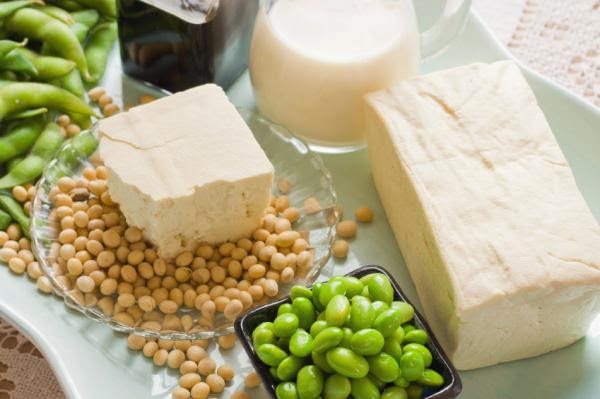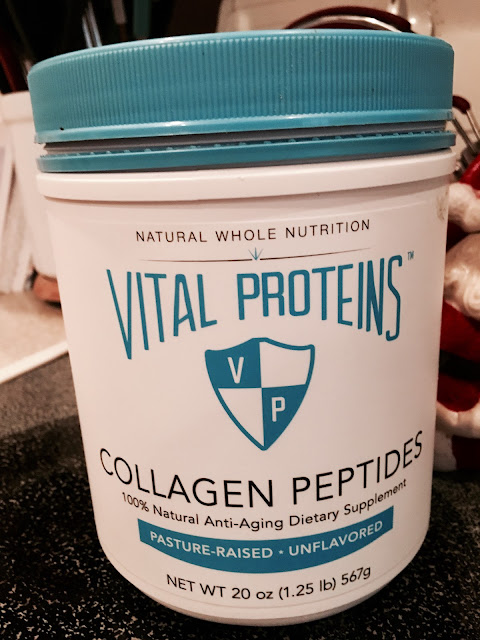The Soy Saga: The Truth About the Bean
I know this will offend some people. The truth is I have wanted to write about this topic for awhile, but I knew I better get my facts together to write about it. Hence the two weeks off the blog. Oh, and being full time in my last year of nurse practitioner school and working. All my choice, but still...let's talk about soy :o)
I have only recently, since the beginning of July, stopped eating soy. So prior to that, it really wasn't on my radar. I had heard bits and pieces about soy milk not being all that great, so I had nonchalantly switched to almond milk.
In addition, I had gone vegetarian last year. Not really for any particular reason, except for the influence of the documentary Forks Over Knives (Food Inc. is better!) and because I wanted to expand my palate to different options. Goodness, I love animals, but I personally believe that humans are a superior race and we can eat whatever we want. Opinion clearly.
However, when I got really sick the beginning of the summer, it became apparent to me that items in my diet needed to change. Not because they aren't ok for some people, but they aren't ok for me. I had noticed over the last couple of months more irregularity with my period, less endurance, more tiredness, more irritability.
The fact of the matter is, I know from my history of having a eating disorder years ago, consistent bloating, food sensitivities, and stomach cramps, there has been some leaky gut and irritable bowel-like symptoms along the way.
Believe it or not, soy is one of the most common culprits of food sensitivities. It's found often in tofu, protein bars, salad dressings, and many processed foods. Let's look at a list of other names for soy, soy-containing ingredients, and ingredients likely to contain soy that you are probably not aware of:
Other names for soy:
Bean curd Soy Sauce
Bean sprouts Soybean
Edamame Soya/Soja
Kinako Tamari
Miso Tofu
Natto Tempeh
Okara Yuba
Shoyu
Soy-Containing Ingredients:
Hydrolyzed soy protein Soy grits
Mono- and di-glycerides Soy lethicin
MSG Soy nuts
Soy Soy protein
Soy albumin Soybean oil
Soy flour Teriyaki sauce
Soy grits Textured vegetable protein (TVP)
Ingredients Likely to Contain Soy:
Bouillion Cubes Hydrolyzed plant protein
Bulking agent Hydrolyzed vegetable protein
Flavorings Mixed Tocopherols
Gum arabic Natural Flavoring (may be soy-based)
Guar gum Vegetable Shortening
Lecithin Vegetable Broth
Stabilizer Vegetable Starch
Thickener Vitamin E (often contains soybean oil)
Vegetable Oil
Some of you may be thinking that none of your food contains these ingredients or you have never heard of them. I encourage you to check your food labels and see how common they really are, and how they are probably in the large majority of foods that you own. So why should you care?
Branded as "healthy," the large majority of soy in the United States is genetically-engineered (GMO). The long term effects are unknown, but some of the effects we do know of are staggering. Here are some:
1) Soy has one of the highest concentrations of goitrogens, a compound that interferes with thyroid function, especially if you have hypothyroidism. According to a randomized, double-blind, crossover study performed by the Journal of Clinical Endocrinology and Metabolism, there is a 3-fold increased risk of worsening hypothyroidism with dietary supplementation of soy.
2) Soy is often contaminated with high levels of aluminum, which can be toxic over time
3) Soy contains anti-nutrients that can inhibit the absorption of nutrients for your body
4) Soy protein is incomplete and inferior to animal protein
5) Pay attention females: the phytoestrogens in soy can disrupt your hormones and potentially contribute to infertility, polycystic ovarian syndrome, and hormone-related cancers such as breast cancer. In 2009, a Brazilian study looked at the impact of soy on the female reproductive system of rats and found that soy consumed for 15 months produced significant changes in the uterus and reproductive cycles, compared with rats given no soy or organic soy.
6) Soy tends to be processed heavily to make up ingredients labeled on "healthy" food
You may not be allergic to soy, but you certainly can be sensitive to it. IBS and similar digestive issues are frequent manifestations of a sensitivity. The best way to find out if soy afflicts you are to start an elimination diet. When you start to reintroduce small amounts of soy back into your diet, you can see what effect it has on you. The paleo diet is a great resource for a soy free diet, and you can find more information on elimination diets at http://2bhealthycoach.com/28-DayCleanse2010031510DP.pdf
Now before you get the impression that I think soy is evil and of the devil, let me explain some of the good effects that have been found from good, non-GMO sources of soy for people that do not have soy sensitivies:
1) According to a research study performed by the Journal of Clinical Endrocrinology and Metabolism, soy protein was found to possibly have a positive influence on bone and calcium homeostasis in postmenopausal women, particularly those not on hormone replacement therapy (HRT)
2) According to the Journal of Pediatric Endocrinology and Metabolism, no hormonal effects were found in infants and children fed soy protein formulas
The best for choice for you? Well, that's up to you, but certainly non-GMO, organic soy is seemingly the best choice for many individuals. For those with gut issues, consider following an elimination diet or one that promotes the absence of soy to see how you feel and contribute to your gut health!
I have only recently, since the beginning of July, stopped eating soy. So prior to that, it really wasn't on my radar. I had heard bits and pieces about soy milk not being all that great, so I had nonchalantly switched to almond milk.
In addition, I had gone vegetarian last year. Not really for any particular reason, except for the influence of the documentary Forks Over Knives (Food Inc. is better!) and because I wanted to expand my palate to different options. Goodness, I love animals, but I personally believe that humans are a superior race and we can eat whatever we want. Opinion clearly.
However, when I got really sick the beginning of the summer, it became apparent to me that items in my diet needed to change. Not because they aren't ok for some people, but they aren't ok for me. I had noticed over the last couple of months more irregularity with my period, less endurance, more tiredness, more irritability.
The fact of the matter is, I know from my history of having a eating disorder years ago, consistent bloating, food sensitivities, and stomach cramps, there has been some leaky gut and irritable bowel-like symptoms along the way.
Believe it or not, soy is one of the most common culprits of food sensitivities. It's found often in tofu, protein bars, salad dressings, and many processed foods. Let's look at a list of other names for soy, soy-containing ingredients, and ingredients likely to contain soy that you are probably not aware of:
Other names for soy:
Bean curd Soy Sauce
Bean sprouts Soybean
Edamame Soya/Soja
Kinako Tamari
Miso Tofu
Natto Tempeh
Okara Yuba
Shoyu
Soy-Containing Ingredients:
Hydrolyzed soy protein Soy grits
Mono- and di-glycerides Soy lethicin
MSG Soy nuts
Soy Soy protein
Soy albumin Soybean oil
Soy flour Teriyaki sauce
Soy grits Textured vegetable protein (TVP)
Ingredients Likely to Contain Soy:
Bouillion Cubes Hydrolyzed plant protein
Bulking agent Hydrolyzed vegetable protein
Flavorings Mixed Tocopherols
Gum arabic Natural Flavoring (may be soy-based)
Guar gum Vegetable Shortening
Lecithin Vegetable Broth
Stabilizer Vegetable Starch
Thickener Vitamin E (often contains soybean oil)
Vegetable Oil
Some of you may be thinking that none of your food contains these ingredients or you have never heard of them. I encourage you to check your food labels and see how common they really are, and how they are probably in the large majority of foods that you own. So why should you care?
Branded as "healthy," the large majority of soy in the United States is genetically-engineered (GMO). The long term effects are unknown, but some of the effects we do know of are staggering. Here are some:
1) Soy has one of the highest concentrations of goitrogens, a compound that interferes with thyroid function, especially if you have hypothyroidism. According to a randomized, double-blind, crossover study performed by the Journal of Clinical Endocrinology and Metabolism, there is a 3-fold increased risk of worsening hypothyroidism with dietary supplementation of soy.
2) Soy is often contaminated with high levels of aluminum, which can be toxic over time
3) Soy contains anti-nutrients that can inhibit the absorption of nutrients for your body
4) Soy protein is incomplete and inferior to animal protein
5) Pay attention females: the phytoestrogens in soy can disrupt your hormones and potentially contribute to infertility, polycystic ovarian syndrome, and hormone-related cancers such as breast cancer. In 2009, a Brazilian study looked at the impact of soy on the female reproductive system of rats and found that soy consumed for 15 months produced significant changes in the uterus and reproductive cycles, compared with rats given no soy or organic soy.
6) Soy tends to be processed heavily to make up ingredients labeled on "healthy" food
You may not be allergic to soy, but you certainly can be sensitive to it. IBS and similar digestive issues are frequent manifestations of a sensitivity. The best way to find out if soy afflicts you are to start an elimination diet. When you start to reintroduce small amounts of soy back into your diet, you can see what effect it has on you. The paleo diet is a great resource for a soy free diet, and you can find more information on elimination diets at http://2bhealthycoach.com/28-DayCleanse2010031510DP.pdf
Now before you get the impression that I think soy is evil and of the devil, let me explain some of the good effects that have been found from good, non-GMO sources of soy for people that do not have soy sensitivies:
1) According to a research study performed by the Journal of Clinical Endrocrinology and Metabolism, soy protein was found to possibly have a positive influence on bone and calcium homeostasis in postmenopausal women, particularly those not on hormone replacement therapy (HRT)
2) According to the Journal of Pediatric Endocrinology and Metabolism, no hormonal effects were found in infants and children fed soy protein formulas
The best for choice for you? Well, that's up to you, but certainly non-GMO, organic soy is seemingly the best choice for many individuals. For those with gut issues, consider following an elimination diet or one that promotes the absence of soy to see how you feel and contribute to your gut health!



Comments
Post a Comment